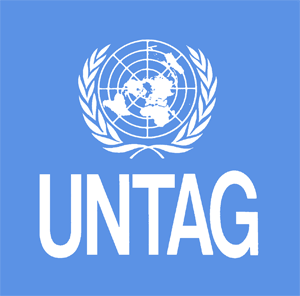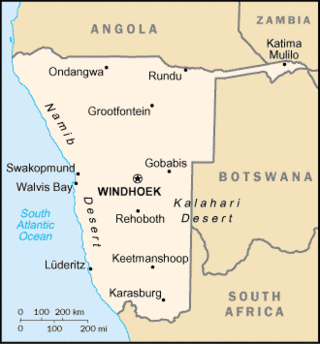
The United Nations Transition Assistance Group (UNTAG) was a United Nations (UN) peacekeeping force deployed from April 1989 to March 1990 in Namibia, known at the time as South West Africa, to monitor the peace process and elections there. Namibia had been occupied by South Africa since 1915, first under a League of Nations mandate and later illegally. Since 1966, South African forces had been combating an insurgency by the People's Liberation Army of Namibia (PLAN), the military wing of the Namibian-nationalist South West African People's Organization (SWAPO). The UN Security Council passed Resolution 435 in 1978, which set out a plan for elections administered by South Africa but under UN supervision and control after a ceasefire. However, only in 1988 were the two parties able to agree to a ceasefire. As UNTAG began to deploy peacekeepers, military observers, police, and political workers, hostilities were briefly renewed on the day the transition process was supposed to begin. After a new round of negotiations, a second date was set and the elections process began in earnest. Elections for the constitutional assembly took place in November 1989. They were peaceful and declared free and fair; SWAPO won a majority of the seats. The new constitution was adopted four months later and it was followed by Namibia's official independence and the successful conclusion of UNTAG.

United Nations Commissioner for South West Africa was a post created by the United Nations General Assembly (UNGA) in 1966 to assert the UN's direct responsibility for South West Africa which was then under illegal occupation by apartheid South Africa.
The Western Contact Group (WCG), representing three of the five permanent members of the UN Security Council - France, United Kingdom and United States - and including Canada and West Germany, launched a joint diplomatic effort in 1977 to bring an internationally acceptable transition to independence for Namibia, after a decade of illegal occupation by apartheid of South Africa.
United Nations Security Council Resolution 264 was adopted on March 20, 1969, after a General Assembly resolution terminated the mandate of South West Africa (Namibia).
United Nations Security Council Resolution 283 was a United Nations Security Council resolution adopted July 29, 1970. It was adopted by 13 votes to none, with France and the United Kingdom abstaining.

Namibia–South Africa relations refers to the current and historical relationship between Namibia and South Africa. South Africa captured the area now known as Namibia from Germany during World War I and governed it, by the name 'South West Africa', until 1990, when the country gained independence under the name 'Namibia'. During those 75 years, thousands of South Africans settled in the territory and South Africa treated the area as effectively a fifth province of both the Union and the Republic, imposing apartheid laws in South West Africa as it did in South Africa.

United Nations Security Council Resolution 366 was adopted unanimously on December 17, 1974, after its previous resolutions and General Assembly Resolution 2145 which terminated South Africa's Mandate over Namibia. The Security Council was concerned with South Africa's continued occupation of the territory and its brutal repression of its people.

United Nations Security Council Resolution 393, adopted on July 30, 1976, after a letter from a representative from Zambia, the Council condemned a recent attack by South Africa in Zambian territory, resulting in the destruction of property and loss of life. The resolution went on to express concern at South Africa's occupation and use of South West Africa as a base for attacking neighbouring African countries, and that the continuation of this would constitute a threat to international peace and security.

United Nations Security Council Resolution 428, adopted unanimously on May 6, 1978, after hearing representations from the People's Republic of Angola, Zambia and the South West Africa People's Organisation (SWAPO), the Council reminded Member States to refrain from using threats and use of force in their international relations. Reiterating Resolution 387 (1976), the present resolution condemned South Africa for its armed invasion of Angola via South West Africa (Namibia).

United Nations Security Council Resolution 439, adopted on November 13, 1978, after recalling resolutions 385 (1976), 431 (1978), 432 (1978) and 435 (1978), the Council condemned South Africa for its decision to proceed unilaterally with elections in Namibia in contravention of previous resolutions. The Council considered this a clear defiance of the authority of the United Nations.

United Nations Security Council resolution 454 was adopted on 2 November 1979. After hearing representations from the People's Republic of Angola, the Council recalled resolutions 387 (1976) and 447 (1979), noting its concern and condemned the continuing attacks on the country by South Africa through illegally-occupied South West Africa.

United Nations Security Council resolution 532, adopted almost unanimously on 31 May 1983, after hearing a report from the Secretary-General and reaffirming resolutions 301 (1971), 385 (1976), 431 (1978), 432 (1978), 435 (1978) and 439 (1978), the Council condemned South Africa's continued occupation of Namibia, then known as South West Africa. All voted in favour other than France, who abstained.

United Nations Security Council resolution 539, adopted on 28 October 1983, after hearing a report from the Secretary-General and reaffirming resolutions 301 (1971), 385 (1976), 431 (1978), 432 (1978), 435 (1978), 439 (1978) and 532 (1983), the council condemned South Africa's continued occupation of Namibia, then known as South West Africa, and the tension and instability prevailing in southern Africa as a result.

United Nations Security Council resolution 571, adopted unanimously on 20 September 1985, after hearing representations from the People's Republic of Angola, the Council recalled resolutions including 387 (1976), 418 (1977), 428 (1978), 447 (1979), 454 (1979), 475 (1980), 545 (1983) and 546 (1984), and expressed its concern at the continuing attacks on the country by South Africa through occupied South West Africa.

United Nations Security Council resolution 574, adopted unanimously on 7 October 1985, after hearing representations from the People's Republic of Angola, the Council recalled resolutions 387 (1976), 418 (1977), 428 (1978), 447 (1979), 454 (1979), 475 (1980), 545 (1983), 546 (1984), 567 (1985) and 571 (1985), and expressed its concern at the continuing attacks on the country by South Africa through occupied South West Africa.

United Nations Security Council resolution 577, adopted unanimously on 6 December 1985, after reaffirming Resolution 571 (1985), the Council endorsed a report by the Security Council Commission of Investigation, condemning the regime in South Africa for its continued and unprovoked attacks against the People's Republic of Angola through the occupied territory of South West Africa.

United Nations Security Council resolution 601, adopted on 30 October 1987, after recalling resolutions 269 (1969), 276 (1970), 301 (1971), 385 (1976), 431 (1978), 432 (1978), 435 (1978), 439 (1978), 532 (1983), 539 (1983) and 566 (1985), the council again condemned South Africa for its continued "illegal" occupation of Namibia and its refusal to comply with previous resolutions.

United Nations Security Council resolution 629, adopted unanimously on 16 January 1989, after recalling resolutions 431 (1978), 435 (1978) and 628 (1989), the council noted that the parties to the Brazzaville Protocol agreed that 1 April 1989 be established as the date of the South African withdrawal from Angola and therefore lead the way to the independence of Namibia.

United Nations Security Council resolution 632, adopted unanimously on 16 February 1989, after reaffirming resolutions 431 (1978), 435 (1978) and 629 (1989), the Council endorsed a report by the Secretary-General Javier Pérez de Cuéllar concerning the United Nations plan for Namibia, reiterating its legal authority over the territory until its independence.

United Nations Security Council resolution 643, adopted unanimously on 31 October 1989, after reaffirming resolutions 435 (1978) and 629 (1989), 632 (1989) and 640 (1989), as well as noting a report by the Secretary-General Javier Pérez de Cuéllar, the council expressed its full intention to implement Resolution 435 of 29 September 1978 regarding the situation in Namibia.






